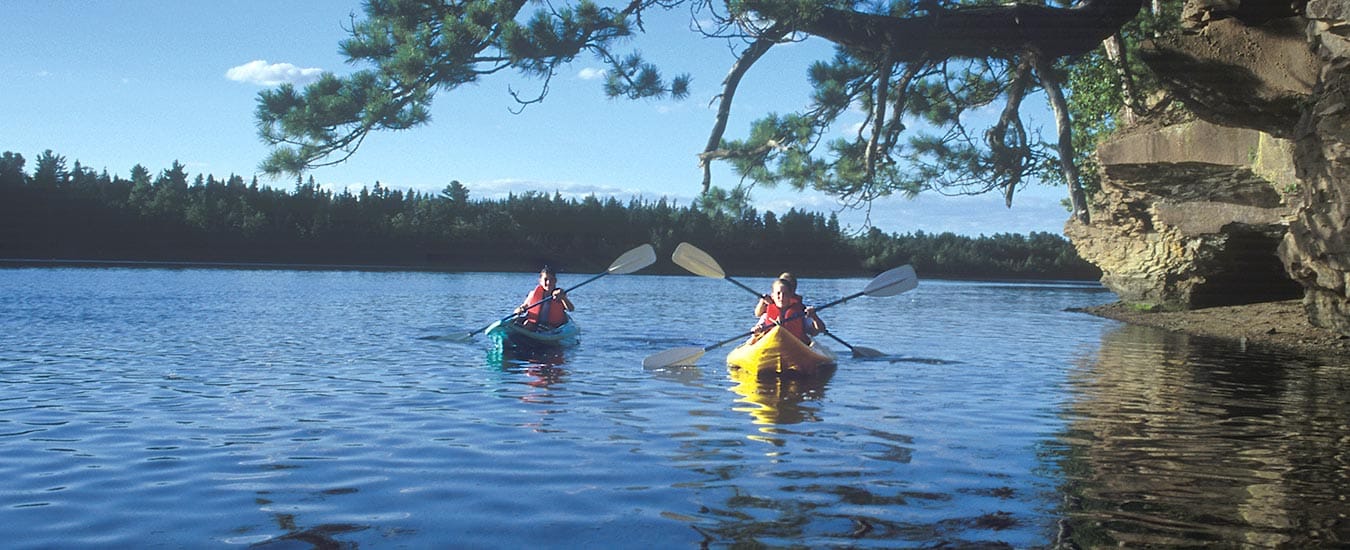En route to Rexton, two kayakers enjoy the peaceful solitude of New Brunswick’s Richibucto River.
It’s a crisp and cool morning in early September. Late summer has settled in earlier than usual. My wife, Sylvie, and I are on vacation, camping on a piece of property we bought three years ago on Upper Rexton Road, a 10-minute drive from Rexton, N.B. We raise our heads to look through our tent trailer’s window. Aimed east, the red morning sky is glowing. We get up and gaze at it, watching without words. The day is upon us, and we have an idea for how to spend it: kayaking on the Richibucto River to the village of Rexton in southeastern New Brunswick.
Shuffling around the trailer, we fire up the stove to boil water and let our five-year-old beagle-shepherd mix, Gage, outside. We collect a backpack, camera, sunglasses, swimsuits, deck shoes and snacks. We brew coffee and pour it into a Thermos. We pick up our paddles and shrug into our life jackets.

In the adjoining shed, we pull two kayaks from the rafters and drag them to the shore. A careful bribe tricks Gage into my kayak. The water laps calmly at the beach and a light breeze skips along the river. Pushing off, we set out for Rexton. A favourable wind is with us, but the paddling is surprisingly challenging. It’s early, and we move slowly because we haven’t woken up yet.
Along the way we can hear the sound of a pony whinnying. Gage picks up the strange scent, cocks his head and huffs. An Icelandic pony farm touches the river on the north side. To our right, a few hundred metres away, buoys mark the deeper channel. A speedboat, the only one we will see during our journey, rumbles past.
The dwellings on either side of the river are indicative of New Brunswick. Crumbling century-old farmhouses stand inconspicuous beside log homes and other grandiose statements of wealth, coexisting and somehow congruous with one another. We struggle past these homes and shacks, the light breeze refusing to assist our trajectory. Paddling harder, we can see the bridge in the middle of town edging closer.
Crossing under the bridge, only a few cars pass overhead. Emerging on the other side, three large masts rooted in the ground appear before us. We have arrived at our destination and we pull up our kayaks on the north side. Gage jumps from my boat and onto shore. Sylvie searches for photographic inspiration. I am inquisitive of the significance of the masts and sails, large and protruding, as if a ship were buried in the water below. Finding strength in the Thermos, I pour and hike while Sylvie snaps.
In downtown Rexton, a manmade walking trail hugs the waterfront; a church and cemetery loom in the distance. Searching for Gage, coffee in hand, I wander the flat gravel trail. An information marker tells me that Rexton was once called Kingston, the name changed long ago to avoid confusion with the Ontario town that was once the capital of Canada. The three masts are a monument to the village’s once-prosperous shipbuilding past. The cemetery is no doubt littered with the names of fishermen lost at sea.
Satisfied with her photographs and hungry from exertion, Sylvie and I sit at a nearby picnic table. The sky is bright and cloudless; the sun reflects its rays on the water. The coffee warms us while the autumn sun does not. We ponder our options: a bite to eat at Tim Hortons or at a breakfast place just off the highway. Curiously, we discover later that both are accessible by water from tributaries of the Richibucto River. We vow to kayak for coffee on our next foray into town.
Satisfied, relaxed, the Thermos drained, the three of us head back to the tiny tent trailer we call home when we’re here. Overhead on the bridge, a car overhead is the only sign of activity on this Sunday morning. There are no joggers or cyclists. Here and there, young and old couples walk along the highway’s shoulder. A traveller passing through gets gas at the Irving station on the other side of the bridge.
Not surprisingly—and this trip was no different—getting to someplace always seems slower than getting back. By our own admission, we make surprising speed with little effort, even though we’re paddling against the wind. As we pass by the homes on the river, we choose our favourites, borrowing concepts, ideas and designs for our own future home.
Despite the direction of the wind, the return trip is much swifter than the departure; it took us two hours of paddling to get to Rexton and an hour and 15 minutes to return. Expecting other kayakers en route, we return to our land simultaneously surprised and disappointed that the large Richibucto River belonged only to us. We felt special that we were able to experience such a beautiful location, and we hope that many others will appreciate its beauty.
Jason Hamilton lives in Toronto with his wife, Sylvie Mazerolle, and their dog, Gage.

